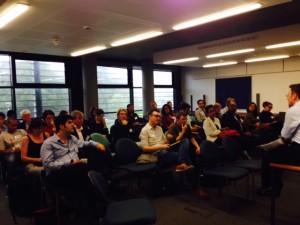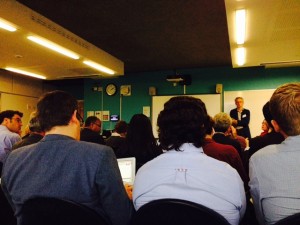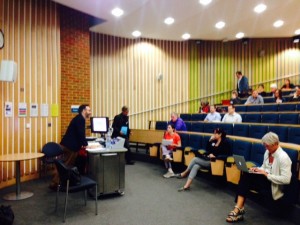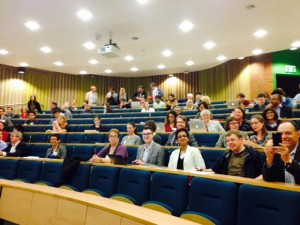1. Background
The launch event was the culmination of many months of planning and discussion by the Development Group (DG)((see Annex for members of the Development Group)). The STIS community has many strong and long-standing informal links and makes a major contribution to the intellectual agenda within UK, as seen for example through the high quality of REF returns and impact case studies associated with the field.
The growth of the field has created the opportunity and the need for a more inclusive and more proactive organisation today when the apparatuses for research training and research funding are being transformed. For example, the next round of the ESRC Doctoral Training Centres will include Calls for ‘Centres for Doctoral Training’ which will not be discipline-based (as most DTCs are) but be thematic and require cross-disciplinary work on themes that bridge the social/natural sciences and Arts/Humanities.
The DG hope that the new national association will build on these links in a more formal way and in particular provide an important platform through which we can influence debate at national level, feed into and respond to research council initiatives, and support the new generation of STIS scholars – especially PhDs and postdocs – as well as engage with national and international bodies, such as EASST.
2. Statement of Foundational Principles
The meeting was opened by Andrew Webster and Robin Williams and delegates received and adopted the Association’s core principles which are:
• to represent our emerging field in discussions with academic communities, with research and education institutions and funding and policy bodies, and with wider publics
• to support the development of research and scholarship and related activities and bring this work to the attention of interested audiences
• to support trans-disciplinary collaboration and engagement with scientists, engineers, government, public and industry
• to support education and training and capacity development
• to explore mutually beneficial interaction and collaboration with other bodies in the field with cognate purposes
3. STIS Themes and Issues
Four themes were discussed in two parallel sessions. The main points raised in each were:
The process and practice of innovation
Chair: Anne-Marie Coles, Leader of the Sustainability, Technology & Innovation Research Group, University of Greenwich; Rapporteur Athena Piterou, University of Greenwich
The Chair raised the issue of whether STIS (or perhaps more specifically Science and Technology Studies [STS]) constitutes a unique scientific paradigm in the study of innovation considering the innovation studies field is also very diverse with most areas of business and management studies having something to contribute to the study of innovation.
One distinction may be that Innovation studies tend to focus at the firm level unlike STS which focuses on socio-technologies. This focus could mean that STS is better positioned to identify emerging technologies earlier. STS explores the nexuses between firms-technologies-users.
STS also addresses technology adoption and reconfiguration rather than solely technology generation (examples given by participants included technologies for the disabled, technology and ageing, and the commercialisation of medical technologies). Innovation is often perceived as the process through which the commercialisation of inventions occurs: there is a need to broaden the term and it might be that theoretical constructs specific to STS such as social constructionism, ANT and critical realism can make a contribution to the study of innovation.
What are the main contributions of STIS in the understanding of innovation?
• An emphasis on bottom-up processes and practices and an avoidance of technological determinism, asking why socio-technical developments take different paths?
• An understanding that innovation processes and structures might be found in diverse fields including domains such as art.
• Innovation entails circulation and use: following a technology from inception to use is a central interest of the field, especially in regard to context of use (and it was suggested that there is a trend away from non-consumer facing technologies such as military technologies towards consumer oriented technologies)
• Factors inhibiting innovation are also addressed by the field (for example, see studies relating to nuclear power and past innovation and practices)
• STIS explicitly deals with social processes and politics (for example in regard to debates over sustainability and fracking technology)
In regard to policy, there are increasing expectations that social science can facilitate the path to innovation, but how and whether the community plays this role is a matter for debate. It was recognised however that closer interaction between innovators and STS researchers would be beneficial.
Governance and policy for STI
Chair: Johan Schot, Director, SPRU, University of Sussex; Rapporteur: Kieron Flanagan, Manchester Institute of Innovation Research, Manchester Business School
The Chair introduced the session, summarising the historical contexts within which governance has emerged, from early days relating to fostering R&D capacity, the development of national systems of innovation approach, the formalisation of technology appraisal and assessment and societal concerns, through to today’s move to ‘Responsible research and innovation’ and a model that presumes a role for civil society in STI policy. He suggested there is a pressing need for a new governance model where civil society is more active in shaping innovation, where there is a need for a more global and more collective range of solutions to the challenges of STI, especially where the nation-state is less powerful in managing STI. AsSIST-UK should provide a platform where the governance challenges of today are understood and guidance on them provided.
Discussion focused on the need for developing a robust understanding of the political economy of STI and the different options and choices that exist but only some of which are chosen. Of equal significance however is that policy circles do not take on the repertoire/findings of STIS research, so some core questions for AsSIST-UK are:
• Why aren’t ideas that members take for granted not adopted or even known in policy circles?
• What can we learn from the economics of innovation which does have generally good links to policy?
• What is distinctive about STIS in the UK, including the UK as a site of study? What do we offer as a UK network?
• How can we encourage the meaningful participation of stakeholders and practitioners into AsSIST-UK, including by mobilising our own contacts and alumni?
• What should be the relationship between the STIS and the STEM communities, given that conversations about the governance of ST&I tend to (and will likely continue to) be dominated by STEM actors? How can we work in partnership with them rather than antagonistically?
• Are the dangers to the STIS community of a more policy/politically engaged stance, such as becoming identified with particular ideological positions?
Discussion centred around whether the STIS community have really engaged with policy actors and debates or rather tended to criticise from the outside, taking a disparaging view of policy makers rather than seeing them as actors embedded in complex systems which constrain them in many ways. Indeed it was felt that a good starting point for AsSIST-UK would be to recognise that both STIS people and policy people are very diverse groups and that we need a much better picture of the governance relations discussed above.
Values and valuation
Chair: Vicky Singleton, Director of Women’s Studies/Director of the Centre for Science Studies, University of Lancaster; Rapporteur Ruth McNally, Anglia Ruskin University
The Chair introduced the session with the issue that all of the work of STIS has value embedded in it and as an Association a key question is how do we engage with the notion of values?
• What particular issues or values (e.g. such as ‘open access’) would we as an association want to attend to or uphold?
• How might AsSIST-UK evaluate different values?
• Should AsSIST-UK attempt to manage different normative positions and become engaged in conflict resolution (e.g. that which is possible between sustainability and economic competitiveness)?
• What unique contribution does STIS make to the concept of values and what should we as an Association do with that?
It was noted that STIS may have already lost the initiative with regard to certain key core values, specifically, that ‘participation’ and ‘openness’ that were originally championed by STIS have since been taken up by a wide range of organisations and interpreted in various ways. This posed the question – should AsSIST-UK presume to define these terms in public discourse?
STIS has historically been engaged in values in another way, namely, through critical analysis of evaluation processes – of the processes for setting acceptable levels of safety or quality, decision-making power over which has typically been given to an elite group. STIS case studies have challenged the presumption that such decisions about acceptable safety or quality levels are neutral and objective and based solely on scientific evidence. Instead, STIS studies have articulated how such decisions are, in practice, always value-laden, and argued for opening up the power to decide to a more representative group – a call for the democratisation of decision-making. Indeed, the ‘democratisation of technoscientific decision-making’ is another value associated with STIS – should this be championed by AsSIST-UK?
However, it was pointed out that even within STIS there is divergence : not all values are shared across STIS. Moreover, adopting a strong value position could get in the way of our research practices. However, one of the hallmarks of STIS is recognition that our research can never be value-free, and in the spirit of transparency it was suggested that we flag up our own values and bring these to the fore when we engage in research
Aside from particular values that STIS studies champion, STIS makes a unique analytical and methodological contribution to the concept of values through its empirical work. From these studies, STIS articulates how, rather than being abstract, values are realised and enacted through material practices, and that they are emergent and relational and co-produced in specific contexts.
We are also experts at exposing the value laden-ness of situations and decisions – the value positions that are often hidden and not recognised – both our own and those of whom we study.
But if we take this expertise forward as an Association, what difference would that make? Providing expert opinion on the concept of values could bring us into conflict with older disciplines, e.g. philosophy, who feel that this is their territory. However, speaking out on our perspective on values could, perhaps, challenge the idea that values are something that are abstract and can be applied with an alternative conceptualisation of how they are socio-material and relational; and it might also raise awareness of hidden values and the extent to which they affect all of our lives.
Engagement and civil society
Chair: Theo Papaioannou, Head of Development Policy and Practice, Open University; Rapporteur: Stevie de Saille, Sociological Studies, University of Sheffield
The Chair introduced the session raising a number of broad themes for debate. For example, engaging citizens and ensuring inclusivity in science has been promoted by some as a solution to a crisis of trust, but is it? Can engagement be more genuinely democratic, more successful in directing innovation towards inclusivity? How does the world of science communication frame the notion of citizen science? What are the benefits and political challenges of engagement with civil society and what can AsSIST-UK do to promote engagement, if indeed that might be one of its roles?
A conventional model of engagement focuses on dialogue – “getting people round the table” – which is seen as the gold standard. But engagement happens in many different ways, via protest for example, patient groups, people calling for access to knowledge, and using or designing socio-technologies so as to be more beneficial for the community. We should not fall into trap of equating engagement merely with dialogue. In this regard it is especially useful to have a new national Association to study how forms of engagement are or can be embedded in this particular political economy at this time. Crucially, the new Association should not in itself take specific positions – instead addressing how society/policy provides access to information is a key priority. Engagement is in this sense contingent on access to relevant information, and the need for the progressive transparency of information.
There are useful developments within government and the Research Councils here. The Association might, for example, work with devolved governments in the four UK nations, who are experimenting with policy at the local level, and who are yet to become path-dependent in the ways in which they define and practice engagement, while the turn towards open policymaking in the Cabinet Office is another opportunity to explore. Eventually AsSIST-UK could have colleagues who take up that task in a more regionally-based way.
There was also a need to engage with diverse publics and individuals, as well as with academic communities outside of STIS – especially Science, Technology, Engineering & Mathematics (STEM) disciplines – and with schools (as for example the RGS does through its engagement with teaching programmes in schools).
There was also a suggestion that AsSIST-UK members should review their projects and impact case studies conducted for the recent Research Excellence Framework (REF) to see how they have actually engaged the community, and to share good practice on this. The Science in Public network is also a useful vehicle through which this might be done, reflecting on how we communicate our ideas, articulating in ways that make sense to people who are not specialists in our area, and thinking about how to present ideas in a mixed audience: communication training as a goal not just for postdocs but for all of us. It was also argued that it was equally important for AsSIST-UK to listen and respond to ideas from diverse publics – especially marginalised groups – about how they make sense of technologies in their everyday lives, and what they see as valuable forms of engagement and what spaces there are for critical engagement.
The role of social media was discussed and the role of different forms through which engagement with AsSIST-UK might be enabled, especially through Twitter which attracts more interests than websites (though we will need the latter too). Whatever routes are used, these need to be chosen in light of a proper communications strategy.
It was suggested that an AsSIST-UK workshop could be developed that would discuss how impact is generated, how different publics understand science and technology and how, and through what media tools, we can communicate STIS ideas to them.
4. Next steps
The meeting discussed a number of priorities for the immediate future: the Development Group should
• Move towards a formal public announcement of the establishing of the Association and its specific aims, role and values
• Establish an interim national email list of contacts which would include all delegates and others unable to attend
• Subsequently, establish a formal register of members and website
• Liaise with other cognate associations, such as BSHS, and networks, such as Science In Public and establish working relations with them
• Build links between STIS and the STEM communities drawing on known links members have already
• Contact our former postgraduate students now working in STI policy settings as a way of broadening contacts/ideas between AsSIST-UK and diverse communities
• Support the establishment of the proposed Postgraduate Forum on Science in Society and make this a semi-independent PGR group attached to AsSIST-UK
• Liaise with the ESRC, Wellcome Trust and other key research funding agencies to discuss how the Association might secure funding for specific initiatives (such as a Summer School)
• Undertake some preliminary work mining the REF returns and impact case studies as well as the ESRC database on research bids funded in the STIS field in order to build a more informed and up-to-date picture of the STIS research base
• Identify timing and location for a national Conference in 2016
• Take forward the proposal for a ‘Controversies in STIS’ text with Routledge and facilitate Palgrave Macmillan in developing links with prospective STIS authors.
AsSIST-UK: Current Development Group Members (2015)
Professor Brian Balmer, Professor in Science Policy Studies, Department of STS, UCL London.
Dr Anne-Marie Coles, Director of the Sustainability, Technology & Innovation Research Group, University of Greenwich
Farzana Dudhwala, Doctoral Candidate, Institute for Science, Innovation and Society , University of Oxford
Professor Jakob Edler, Professor of Innovation Policy and Strategy, and Executive Director, Manchester Institute of Innovation Research, Manchester Business School
Dr Kieron Flanagan, Senior Lecturer in Science and Technology Policy, Manchester Institute of Innovation Research, Manchester Business School
Dr Dawn Goodwin, Centre for Science Studies and Medical School. University of Lancaster
Professor Reiner Grundmann, Professor of Science and Technology Studies, University of Nottingham
Professor Adam Hedgecoe, Director of Cesagene, School of Social Sciences, Cardiff University
Professor Anne Kerr, Head of School, Sociology and Social Policy, University of Leeds
Dr Javier Lezaun, Deputy Director, Institute for Science, Innovation and Society, University of Oxford
Professor Paul Martin, Head of Department of Sociological Studies, University of Sheffield
Dr Theo Papaioannou, Reader in Politics of Innovation and Development, Faculty of Maths, Computing and Technology, The Open University
Dr Stevienna de Saille, Postdoctoral Research Fellow, Department of Sociological Studies, University of Sheffield
Professor Johan Schot, Director, SPRU, University of Sussex.
Dr Vicky Singleton, Co-Director of Lancaster Centre for Science Studies and Co-Director of Centre for Gender and Women’s Studies.
Professor Fred Steward, Professor of Innovation and Sustainability, PSI, University of Westminster/President EASST
Dr Jack Stilgoe, Department of STS, UCL London.
Julia Swallow, Doctoral Candidate, Sociology and Social Policy, University of Leeds
Professor Andrew Webster, Director SATSU, University of York
Professor Robin Williams, Director, ISSTI, University of Edinburgh
Ros Williams, Doctoral Candidate, SATSU, Department of Sociology, University of York



